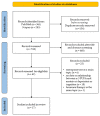n-3 PUFA Improve Emotion and Cognition during Menopause: A Systematic Review
- PMID: 35565948
- PMCID: PMC9100978
- DOI: 10.3390/nu14091982
n-3 PUFA Improve Emotion and Cognition during Menopause: A Systematic Review
Abstract
Women show an increased risk of cognitive impairment and emotional disorders, such as anxiety and depression, when approaching menopause. Data on risk and protection factors have yielded robust evidence on the effects of lifestyle factors, such as diet, in preserving emotional and cognitive functioning. This review focused on the effects of omega-3 polyunsaturated fatty acids (n-3 PUFA) on anxiety, depression, and cognition during the menopausal transition. This systematic review considered all articles published until 31 December 2021, and the search was performed on two databases, PubMed and Scopus. The fields of interest were "menopause", "n-3 PUFA" and "emotional and cognitive aspects". Out of the 361 articles found on PubMed and 283 on Scopus, 17 met inclusion criteria. They encompassed 11 human and 6 animal studies. Most studies reported relieved depressive symptoms in relation to n-3 PUFA intake. While controversial results were found on anxiety and cognition in humans, n-3 PUFA consistently reduced anxiety symptoms and improved cognition in animal studies. Taken together, n-3 PUFA intake shows beneficial effects on emotional and cognitive behaviours during menopause transition. However, further investigations could increase knowledge about the effectiveness of n-3 PUFA on psychological well-being in this delicate period of feminine life.
Keywords: anxiety; cognition; depression; menopausal transition; menopause; n-3 PUFA; ovariectomy.
Conflict of interest statement
The authors declare no conflict of interest.
Figures



References
Publication types
MeSH terms
Substances
Grants and funding
LinkOut - more resources
Full Text Sources
Miscellaneous

